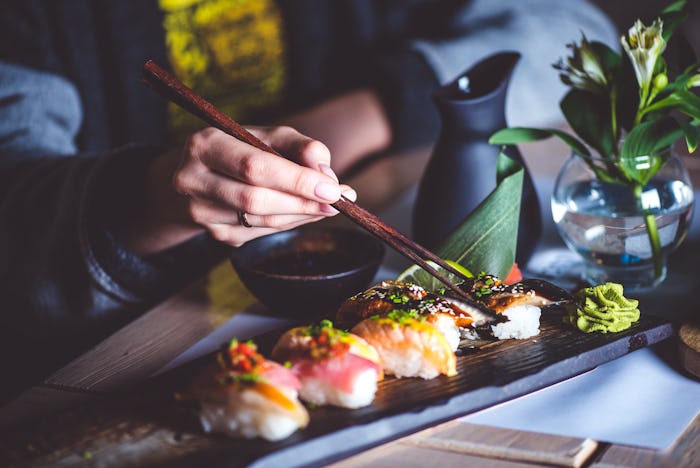Life

What Every Pregnant Woman Should Know If She Wants To Eat Sushi In Her 1st Trimester
From the moment you find out you're pregnant, you're inundated with a seemingly endless list of rules. From how to sleep to whether or not you should work out, everyone wants to share their opinions and so-called guidelines. Nothing is as harshly scrutinized as what a pregnant woman decides to eat or drink, though, and myths as to what's safe and what's not are often repeated unchecked. So, can eating sushi in the first trimester cause a miscarriage? Like every other question you will inevitably ask when you're growing another human being inside your body, it's important to separate fact from fiction when deciding what's best for you and your always-growing fetus.
Most are familiar with the "you can't eat sushi when you're pregnant" rule. The problem, however and right off the bat, is people's loose definition of the word "sushi." According to Sushi.com, sushi is any food that has rice vinegar. In other words, not all sushi contains raw seafood or fish. Sashimi, on the other hands, is always thin slices of raw seafood and fish, served without rice. Knowing the difference is vital when figuring out as to whether or not "sushi" is safe to consume when you're pregnant. After all, you can't know what's OK to eat if you don't know what "it" is.
The concern, of course, in having a pregnant woman consume sushi (or, really, sashimi) is the potential presence of bacteria, because the seafood and/or fish is raw, and the possibility of high levels of mercury. For these reasons, the Federal Drug Administration (FDA) advises pregnant women not to eat raw fish at all, saying:
"Pregnant women and young children often have weaker immune systems and are more at risk for food borne illnesses"
The American Pregnancy Association (APA) reiterates the FDA's warning, but they also remind readers that fish is a healthy food for expectant mothers to consume. In fact, researchers at the Journal of Canadian Family Physicians found that although high levels of mercury remain a concern, most commercially prepared foods are subject to such stringent standards that the risk to baby is low, stating:
"Although heating or cooking food is the best way to inactivate food-borne pathogens, improved standards and surveillance have reduced the prevalence of contaminated foods at grocery stores."
They go on to reiterate that pregnant women can eat these food products if they wish to, saying, "It's no longer necessary for pregnant women to avoid foods like sushi and sashimi." In other words, and while the risk of contamination and/or food poisoning remains, eating sushi in your first trimester will not increase your risk of a miscarriage.
According to the March of Dimes, 10-15 percent of pregnancies end in miscarriage, but the reasons behind most miscarriages remain relatively unknown. WebMD, however, says, "miscarriage sometimes happens because there is a weakness of the cervix, called an incompetent cervix, which cannot hold the pregnancy." These miscarriages, however, usually only occur in the second trimester. Parents highlights other potential causes for miscarriage, including chromosomal abnormality, thyroid disorders, diabetes, drug and/or alcohol abuse, immunologic disorders, and blood clot disorders. Eating sushi and/or sashimi would not exacerbate any of these particular situations, which means what you eat probably has nothing to do with whether or not you experience a miscarriage.
It's always wise to check with your doctor, but the research seems to suggest that eating sushi and sashimi during pregnancy does not constitute a significant danger to pregnant women. In fact, most scientists concur that the benefits of eating a diet rich in fish far outweigh the possible risks of becoming unwell. So go ahead and order your favorite roll, just make sure to stick to fish low in mercury.